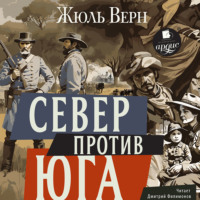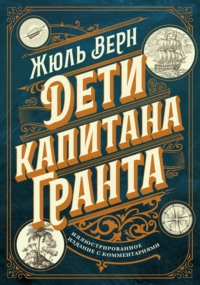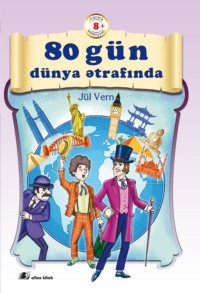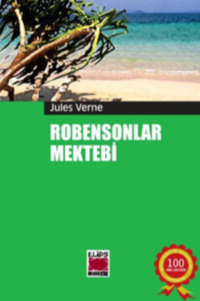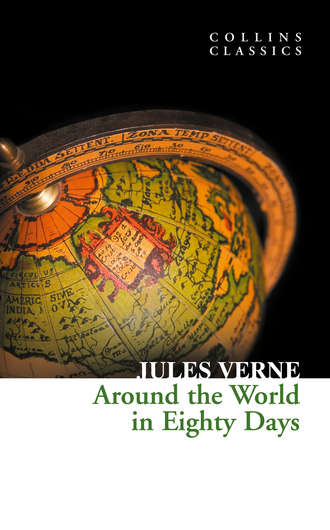
Полная версия
Around the World in Eighty Days
Sir Francis Cromarty had recognised the originality of his travelling companion, although he had only studied him with his cards in his hand, and between two rubbers. He was ready to ask whether a human heart beat beneath this cold exterior, whether Phileas Fogg had a soul alive to the beauties of nature and to moral aspirations. That was the question for him. Of all the oddities the general had met, none were to be compared to this product of the exact sciences. Phileas Fogg had not kept secret from Sir Francis Cromarty his plan for a tour around the world, nor the conditions under which he was carrying it out. The general saw in this bet only an eccentricity without a useful aim, and which was wanting necessarily in the transire benefaciendo which ought to guide every reasonable man. In the manner in which this singular gentleman was moving on, he would evidently be doing nothing, either for himself or for others.
An hour after having left Bombay, the train, crossing the viaducts, had left behind the Island of Salcette and reached the mainland. At the station Callyan, it left to the right the branch which, via Kandallah and Pounah descends towards the south-east of India, and reaches the station Panwell. At this point, it became entangled in the defiles of the Western Ghaut mountains, with bases of trappe and basalt, whose highest summits are covered with thick woods.
From time to time, Sir Francis Cromarty and Phileas Fogg exchanged a few words, and at this moment the general, recommencing a conversation which frequently lagged, said:
“A few years ago, Mr Fogg, you would have experienced at this point a delay which would have probably interrupted your journey.”
“Why so, Sir Francis?”
“Because the railway stopped at the base of these mountains, which had to be crossed in a palanquin or on a pony’s back as far as the station of Kandallah, on the opposite slope.”
“That delay would not have deranged my programme,” replied Mr Fogg. “I would have foreseen the probability of certain obstacles.”
“But, Mr Fogg,” replied the general, “you are in danger of having a bad business on your hands with this young man’s adventure.”
Passepartout, with his feet wrapped up in his cloak, was sleeping soundly, and did not dream that they were talking about him.
“The British Government is extremely severe, and rightly, for this kind of trespass,” replied Sir Francis Cromarty. “It insists, above all things, that the religious customs of the Hindus shall be respected, and if your servant had been taken—”
“Yes, if he had been taken, Sir Francis,” replied Mr Fogg, “he would have been sentenced, he would have undergone his punishment, and then he would have quietly returned to Europe. I do not see how this matter could have delayed his master!”
And, thereupon, the conversation stopped again. During the night, the train crossed the Ghauts, passed on to Nassik, and the next day, the 21st of October, it was hurrying across a comparatively flat country, formed by the Khandeish territory. The country, well cultivated, was strewn with small villages, above which the minaret of the pagoda took the place of the steeple of the European church. Numerous small streams, principally tributaries of the Godavery, irrigated this fertile country.
Passepartout having waked up, looked around, and could not believe that he was crossing the country of the Hindus in a train of the Great Peninsular Railway. It appeared improbable to him. And yet there was nothing more real! The locomotive, guided by the arm of an English engineer and heated with English coal, was puffing out its smoke over plantations of cotton trees, coffee, nutmeg, clove, and red pepper. The steam twisted itself into spirals about groups of palms, between which appeared picturesque bungalows, a few viharis (a sort of abandoned monasteries), and wonderful temples enriched by the inexhaustible ornament of Indian architecture. Then immense reaches of country stretched out of sight, jungles, in which were not wanting snakes and tigers whom the noise of the train did not frighten, and finally forests cut through by the route of the road, still the haunt of elephants, which, with a pensive eye, looked at the train as it passed so rapidly.
During the morning, beyond the station of Malligaum, the travellers traversed that fatal territory, which was so frequently drenched with blood by the sectaries of the goddess Kali. Not far off rose Ellora and its splendid pagodas, and the celebrated Aurungabad, the capital of the ferocious Aureng-Zeb, now simply the principal place of one of the provinces detached from the kingdom of Nizam. It was over this country that Feringhea, the chief of the Thugs, the king of stranglers, exercised his dominion. These assassins, united in the association that could not be reached, strangled in honour of the goddess of death, victims of every age, without ever shedding blood, and there was a time when the ground could not be dug up anywhere in this neighbourhood without finding a corpse. The British Government has been able, in great part, to prevent these murders, but the horrible organisation exists yet, and carries on its operations.
At half-past twelve, the train stopped at the station at Burhampour, and Passepartout was able to obtain for gold a pair of Indian slippers, ornamented with false pearls, which he put on with an evident show of vanity. The travellers took a hasty breakfast, and started again for Assurghur, after having for a moment stopped upon the shore of the Tapty, a small river emptying into the Gulf of Cambay, near Surat.
It is opportune to mention the thoughts with which Passepartout was busied. Until his arrival at Bombay, he had thought that matters would go no farther. But now that he was hurrying at full speed across India, his mind had undergone a change. His natural feelings came back to him with a rush. He felt again the fancied ideas of youth, he took seriously his master’s plans, he believed in the reality of the bet, and consequently in this tour of the world, and in this maximum of time which could not be exceeded. Already he was disturbed at the possible delays, the accidents which might occur upon the route. He felt interested in the wager, and trembled at the thought that he might have compromised it the evening before by his unpardonable foolishness, so that, much less phlegmatic than Mr Fogg, he was much more uneasy. He counted and recounted the days that had passed, cursed the stopping of the train, accused it of slowness, and blamed Mr Fogg in petto for not having promised a reward to the engineer. The good fellow did not know that what was possible upon a steamer was not on a railway train, whose speed is regulated.
Towards evening they entered the defiles of the mountains of Sutpour, which separate the territory of Khandeish from that of Bundelcund.
The next day, the 22nd of October, Passepartout, having consulted his watch, replied to a question of Sir Francis Cromarty that it was three o’clock in the morning. In fact, this famous watch, always regulated by the meridian of Greenwich, which is nearly seventy-seven degrees west, ought to be and was four hours slow.
Sir Francis then corrected the hour given by Passepartout, and added the same remark that the latter had already heard from Fix. He tried to make him understand that he ought to regulate his watch on each new meridian, and that since he was constantly going towards the east, that is, in the face of the sun, the days were shorter by as many times four minutes as he had crossed degrees. It was useless. Whether the stubborn fellow had understood the remarks of the general or not, he persisted in not putting his watch ahead, which he kept always at London time. An innocent madness at any rate, which could hurt no one.
At eight o’clock in the morning, and fifteen miles before they reached Rothal, the train stopped in the midst of an immense opening, on the edge of which were some bungalows and workmen’s huts. The conductor of the train passed along the cars calling out, “The passengers will get out here!”
Phileas Fogg looked at Sir Francis Cromarty, who appeared not to understand this stop in the midst of a forest of tamarinds and acacias. Passepartout, not less surprised, rushed on to the track and returned almost immediately, crying, “Monsieur, no more railway!”
“What do you mean?” asked Sir Francis Cromarty.
“I mean that the train goes no farther.”
The brigadier-general immediately got out of the car. Phileas Fogg, in no hurry, followed him. Both spoke to the conductor.
“Where are we?” asked Sir Francis Cromarty.
“At the hamlet of Kholby,” replied the conductor.
“We stop here?”
“Without doubt. The railway is not finished—”
“How! It is not finished?”
“No! There is still a section of fifty miles to construct between this point and Allahabad, where the track commences again.”
“But the papers have announced the opening of the entire line.”
“But, generally, the papers were mistaken.”
“And you give tickets from Bombay to Calcutta!” replied Sir Francis Cromarty, who was beginning to be excited.
“Of course,” replied the conductor; “but travellers know very well that they have to be otherwise transported from Kholby to Allahabad.”
Sir Francis Cromarty was furious. Passepartout would have willingly knocked the conductor down, who could not help himself. He did not dare look at his master.
“Sir Francis,” said Mr Fogg simply, “we will go, if you will be kind enough to see about some way of reaching Allahabad.”
“Mr Fogg, this is a delay absolutely prejudicial to your interests!”
“No, Sir Francis, it was provided for.”
“What, did you know that the railway—”
“By no means, but I knew that some obstacle or other would occur sooner or later upon my route. Now, nothing is interfered with. I have gained two days which I can afford to lose. A steamer leaves Calcutta for Hong-Kong at noon on the 25th. This is only the 23rd, and we shall arrive at Calcutta in time.”
Nothing could be said in reply to such complete certainty.
It was only too true that the finished portion of the railway stopped at this point. The newspapers are like certain watches which have a mania of getting ahead of time, and they had announced the finishing of the line prematurely. The most of the passengers knew of this break in the line, and descending from the train, they examined the vehicles of all sorts in the village, four-wheeled palkigharis, carts drawn by zebus, a sort of ox with humps, travelling cars resembling walking pagodas, palanquins, ponies, etc. Mr Fogg and Sir Francis Cromarty, after having hunted through the entire village, returned without having found anything.
“I shall go on foot,” said Mr Fogg.
Passepartout, who had then rejoined his master, made a significant grimace, looking down at his magnificent but delicate slippers. Very fortunate, he had also been hunting for something, and hesitating a little, he said:
“Monsieur, I believe I have found a means of conveyance.”
“What?”
“An elephant belonging to an Indian living a hundred steps from here.”
“Let us go to see the elephant,” replied Mr Fogg. Five minutes later, Phileas Fogg, Sir Francis Cromarty, and Passepartout arrived at a hut which was against an enclosure of high palisades. In the hut there was an Indian, and in the enclosure an elephant. Upon their demand, the Indian took Mr Fogg and his two companions into the enclosure.
They found there a half-tamed animal, which his owner was raising, not to hire out, but as a beast of combat. To this end he had commenced to modify the naturally mild character of the animal in a manner to lead him gradually to that paroxysm of rage called “mutsh” in the Hindu language, and that by feeding him for three months with sugar and butter. This treatment may not seem the proper one to obtain such a result, but it is none the less employed with success by their keepers.
Kiouni, the animal’s name, could, like all his fellows, go rapidly on a long march, and in default of other conveyance, Phileas Fogg determined to employ him. But elephants are very expensive in India, where they are beginning to get scarce. The males, which alone are fit for circus feats, are very much sought for. These animals are rarely reproduced when they are reduced to the tame state, so that they can be obtained only by hunting. So they are the object of extreme care, and when Mr Fogg asked the Indian if he would hire him his elephant he flatly refused.
Fogg persisted, and offered an excessive price for the animal, ten pounds per hour. Refused. Twenty pounds. Still refused. Forty pounds. Refused again. Passepartout jumped at every advance in price. But the Indian would not be tempted. The sum was a handsome one, however. Admitting the elephant to be employed fifteen hours to reach Allahabad, it was six hundred pounds earned for his owner.
Phileas Fogg, without being at all excited, proposed then to the Indian to buy his animal, and offered him at first one thousand pounds. The Indian would not sell! Perhaps the rogue scented a large transaction.
Sir Francis Cromarty took Mr Fogg aside and begged him to reflect before going further. Phileas Fogg replied to his companion that he was not in the habit of acting without reflection, that a bet of twenty thousand pounds was at stake, that this elephant was necessary to him, and that, should he pay twenty times his value, he would have this elephant.
Mr Fogg went again for the Indian, whose small eyes, lit up with greed, showed that with him it was only a question of price. Phileas Fogg offered successively twelve hundred, fifteen hundred, eighteen hundred, and finally two thousand pounds. Passepartout, so rosy ordinarily, was pale with emotion.
At two thousand pounds the Indian gave up.
“By my slippers,” cried Passepartout, “here is a magnificent price for elephant meat!”
The business concluded, all that was necessary was to find a guide. That was easier. A young Parsee, with an intelligent face, offered his services. Mr Fogg accepted him, and offered him a large reward to sharpen his wits. The elephant was brought out and equipped without delay. The Parsee understood perfectly the business of “mahout,” or elephant-driver. He covered with a sort of saddle cloth the back of the elephant, and put on each flank two kinds of rather uncomfortable howdahs.
Phileas Fogg paid the Indian in bank-notes taken from the famous carpet bag. It seemed as if they were taken from Passepartout’s very vitals. Then Mr Fogg offered to Sir Francis Cromarty to convey him to Allahabad. The general accepted; one passenger more was not enough to tire this enormous animal. Some provisions were bought at Kholby. Sir Francis Cromarty took a seat in one of the howdahs, Phileas Fogg in the other. Passepartout got astride the animal, between his master and the brigadier-general. The Parsee perched upon the elephant’s neck, and at nine o’clock the animal, leaving the village, penetrated the thick forest of palm trees.
CHAPTER 12
In which Phileas Fogg and his Companions venture through the Forests of India, and what follows
The guide, in order to shorten the distance to be gone over, left to his right the line of the road, the construction of which was still in process. This line, very crooked, owing to the capricious ramifications of the Vindhia mountains, did not follow the shortest route, which it was Phileas Fogg’s interest to take. The Parsee, very familiar with the roads and paths of the country, thought to gain twenty miles by cutting through the forest, and they submitted to him.
Phileas Fogg and Sir Francis Cromarty, plunged to their necks in their howdahs, were much shaken up by the rough trot of the elephant, whom his mahout urged into a rapid gait. But they bore it with the peculiar British apathy, talking very little, and scarcely seeing each other.
As for Passepartout, perched upon the animal’s back, and directly subjected to the swaying from side to side, he took care, upon his master’s recommendation, not to keep his tongue between his teeth, as it would have been cut short off. The good fellow, at one time thrown forward on the elephant’s neck, at another thrown back upon his rump, was making leaps like a clown on a springboard. But he joked and laughed in the midst of his somersaults, and from time to time he would take from his bag a lump of sugar, which the intelligent Kiouni took with the end of his trunk, without interrupting for an instant his regular trot.
After two hours’ march the guide stopped the elephant, and gave him an hour’s rest. The animal devoured branches of trees and shrubs, first having quenched his thirst at a neighbouring pond. Sir Francis Cromarty did not complain of this halt. He was worn out. Mr Fogg appeared as if he had just got out of bed.
“But he is made of iron!” said the brigadier-general, looking at him with admiration.
“Of wrought iron,” replied Passepartout, who was busy preparing a hasty breakfast.
At noon the guide gave the signal for starting. The country soon assumed a very wild aspect. To the large forests there succeeded copses of tamarinds and dwarf palms, then vast, arid plains, bristling with scanty shrubs, and strewn with large blocks of syenites. All this part of upper Bundelcund, very little visited by travellers, is inhabited by a fanatical population, hardened in the most terrible practices of the Hindu religion. The government of the British could not have been regularly established over a territory subject to the influence of the rajahs, whom it would have been difficult to reach in their inaccessible retreats in the Vindhias.
They were descending the last declivities of the Vindhias. Kiouni had resumed his rapid gait. Towards noon, the guide went round the village of Kallenger, situated on the Cani, one of the tributaries of the Ganges. He always avoided inhabited places, feeling himself safer, in those desert open stretches of country which mark the first depressions of the basin of the great river. Allahabad was not twelve miles to the north-east. Halt was made under a clump of banana trees, whose fruit, as healthy as bread, “as succulent as cream,” travellers say, was very much appreciated.
At two o’clock, the guide entered the shelter of a thick forest, which he had to traverse for a space of several miles. He preferred to travel thus under cover of the woods. At all events, up to this moment there had been no unpleasant meeting, and it seemed as if the journey would be accomplished without accident, when the elephant, showing some signs of uneasiness, suddenly stopped.
It was then four o’clock.
“What is the matter?” asked Sir Francis Cromarty, raising his head above his howdah.
“I do not know, officer,” replied the Parsee, listening to a confused murmur which came through the thick branches.
A few moments after, this murmur became more defined. It might have been called a concert, still very distant, of human voices and brass instruments.
Passepartout was all eyes, all ears. Mr Fogg waited patiently, without uttering a word.
The Parsee jumped down, fastened the elephant to a tree, and plunged into the thickest of the undergrowth. A few minutes later he returned, saying:
“A Brahmin procession coming this way. If it is possible, let us avoid being seen.”
The guide unfastened the elephant, and led him into a thicket, recommending the travellers not to descend. He held himself ready to mount the elephant quickly, should flight become necessary. But he thought that the troop of the faithful would pass without noticing him, for the thickness of the foliage entirely concealed him.
The discordant noise of voices and instruments approached. Monotonous chants were mingled with the sound of the drums and cymbals. Soon the head of the procession appeared from under the trees, at fifty paces from the spot occupied by Mr Fogg and his companions. Through the branches they readily distinguished the curious personnel of this religious ceremony.
In the first line were the priests, with mitres upon their heads and attired in long robes adorned with gold and silver lace. They were surrounded by men, women, and children, who were singing a sort of funeral psalmody, interrupted at regular intervals by the beating of tom-toms and cymbals. Behind them on a car with large wheels, whose spokes and felloes represented serpents intertwined, appeared a hideous statue, drawn by two pairs of richly caparisoned zebus. This statue had four arms, its body coloured with dark red, its eyes haggard, its hair tangled, its tongue hanging out, its lips coloured with henna and betel. Its neck was encircled by a collar of skulls, around its waist a girdle of human hands. It was erect upon a prostrate giant, whose head was missing.
Sir Francis Cromarty recognised this statue.
The goddess Kali,” he murmured; “the goddess of love.”
“Of death, I grant, but of love, never!” said Passepartout. “The ugly old woman!”
The Parsee made him a sign to keep quiet.
Around the statue there was a group of old fakirs, jumping and tossing themselves about convulsively. Smeared with bands of ochre, covered with cross-like cuts, whence their blood escaped drop by drop—stupid fanatics, who, in the great Hindu ceremonies, precipitated themselves under the wheels of the car of Juggernaut.
Конец ознакомительного фрагмента.
Текст предоставлен ООО «ЛитРес».
Прочитайте эту книгу целиком, купив полную легальную версию на ЛитРес.
Безопасно оплатить книгу можно банковской картой Visa, MasterCard, Maestro, со счета мобильного телефона, с платежного терминала, в салоне МТС или Связной, через PayPal, WebMoney, Яндекс.Деньги, QIWI Кошелек, бонусными картами или другим удобным Вам способом.



